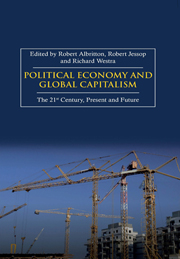Book contents
- Frontmatter
- Contents
- List of Abbreviations
- Notes on Contributors
- Introduction: Political Economy and Global Capitalism
- Part 1 Political Economy of the Present
- Part 2 Political Economy of a Progressive Global Future
- Introduction
- 6 Volatile, Uneven and Combined Capitalism
- 7 The Erosion of Non-Capitalist Institutions and the Reproduction of Capitalism
- 8 The Transformative Moment
- 9 Frontiers of Cadre Radicalization in Contemporary Capitalism
- 10 Green Marxism and the Institutional Structure of a Global Socialist Future
- Index
9 - Frontiers of Cadre Radicalization in Contemporary Capitalism
from Part 2 - Political Economy of a Progressive Global Future
Published online by Cambridge University Press: 05 March 2012
- Frontmatter
- Contents
- List of Abbreviations
- Notes on Contributors
- Introduction: Political Economy and Global Capitalism
- Part 1 Political Economy of the Present
- Part 2 Political Economy of a Progressive Global Future
- Introduction
- 6 Volatile, Uneven and Combined Capitalism
- 7 The Erosion of Non-Capitalist Institutions and the Reproduction of Capitalism
- 8 The Transformative Moment
- 9 Frontiers of Cadre Radicalization in Contemporary Capitalism
- 10 Green Marxism and the Institutional Structure of a Global Socialist Future
- Index
Summary
Introduction
In this chapter, I argue that in the current phase of social development, a crisis of exhaustion of the biosphere may be beginning to radicalize segments, or ‘fractions’ of what I call the class of managerial cadre – the auxiliary, executive arm of the capitalist class properly speaking.
The capitalist ruling class is the owner of capital, who by its restless quest for high-yield assets decides the direction of social development. The cadre are the paid functionaries overseeing that development in the economy and society at large, integrating all its technical, educational, and other aspects, and as organic intellectuals, providing ideological cohesion to the consequences of this particular course. Thus, when capitalist discipline is effectively imposed on a global scale, the cadre will be involved in managing globalization in all its aspects, from actual transnational business operations and training other managers, via propaganda praising the blessings of free trade and payments, to organizing forms of ‘global governance’. In the process, certain fractions of the cadre are in a position to observe, at close range, current developments from a different angle than that of the stock market operator. And what they see is not necessarily encouraging. Indeed as Anthony Hopkins playing Nixon in Oliver Stone's movie says to his First Lady, ‘It's not pretty, Buddy! It's not pretty!’
The effect of the world-embracing operation of capital creates complex webs of interaction, a socialization of labour on a planetary scale.
- Type
- Chapter
- Information
- Political Economy and Global CapitalismThe 21st Century, Present and Future, pp. 201 - 218Publisher: Anthem PressPrint publication year: 2007



